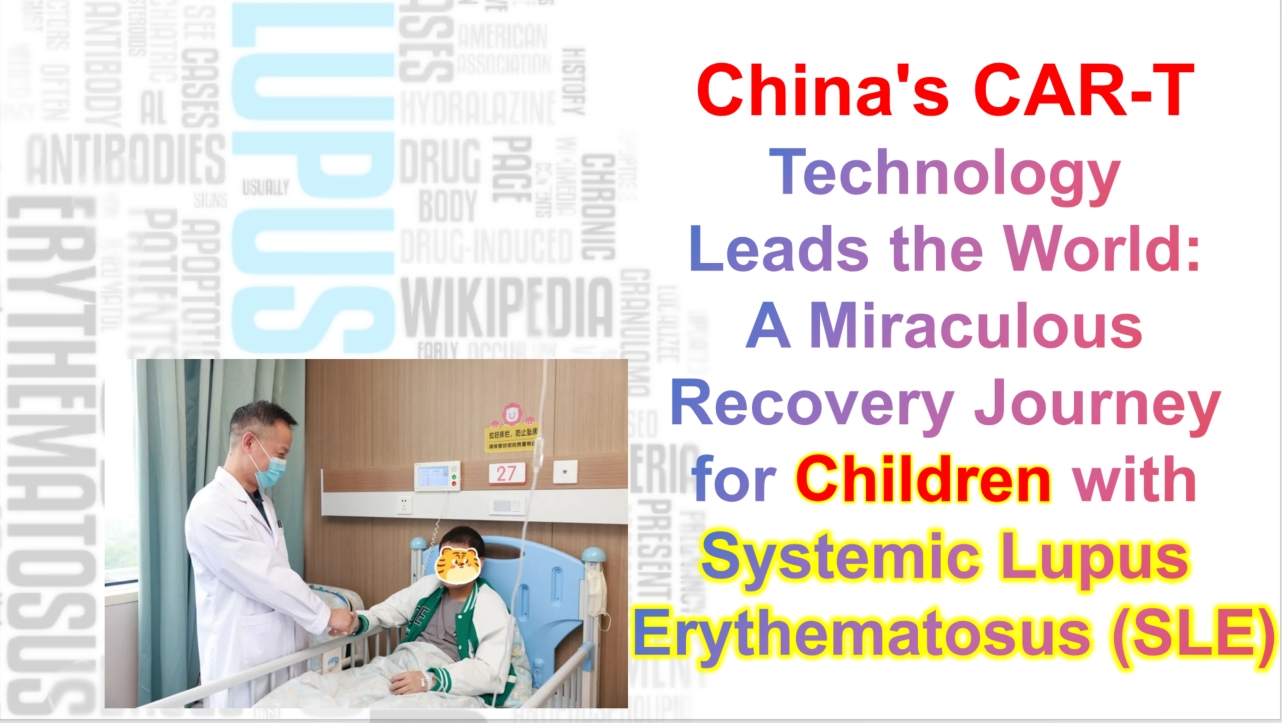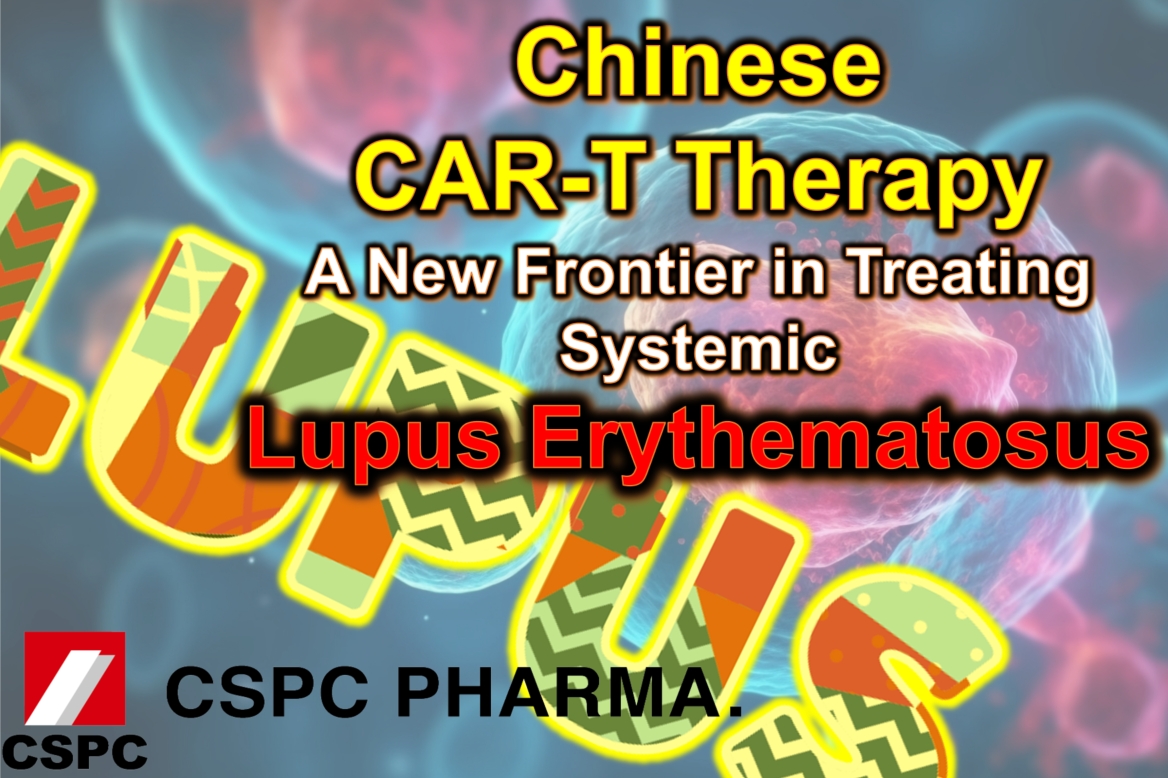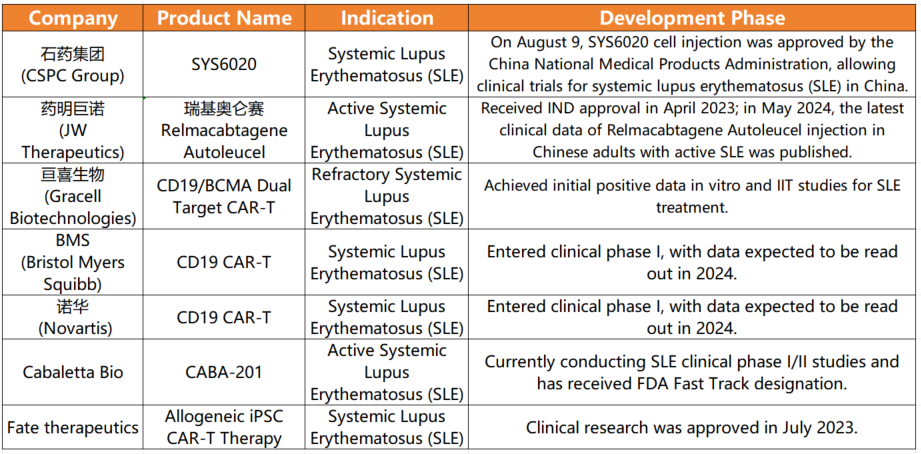Warning: Trying to access array offset on value of type bool in /www/wwwroot/www.medtourcn.com/wp-content/themes/medical-directory/framework/theme/medicaldirectory-image.php on line 78
Warning: Trying to access array offset on value of type bool in /www/wwwroot/www.medtourcn.com/wp-content/themes/medical-directory/framework/theme/medicaldirectory-image.php on line 79

China’s CAR-T Technology Leads the World: A Miraculous Recovery Journey for Children with systemic lupus erythematosus (SLE)
**China’s CAR-T Technology Leads the World: A Miraculous Recovery Journey for Children with systemic lupus erythematosus (SLE)**

LUPUS
#SLE #lupus #systemiclupuserythematosus #CAR_Ttherapy #CancerSurvivor #ChineseHealthcare#PatientStory
In the field of medicine, the boundary between science and miracles is often blurred. This October, news from Zhejiang, China, shocked the world: 20 children suffering from refractory systemic lupus erythematosus (SLE) successfully discontinued the use of steroids and all immunosuppressants after receiving CAR-T cell therapy.
This global breakthrough not only brings hope to patients and their families but also demonstrates the immense potential of CAR-T therapy in the treatment of autoimmune diseases.
### Immune System Reset, New Life Begins
Systemic lupus erythematosus (SLE) is a complex autoimmune disease that many patients struggle to control despite long-term reliance on medications. This clinical trial, led by a team of renowned Chinese medical experts, marks the first time autologous CD19-targeted CAR-T cells have been applied to treat pediatric SLE patients. In just seven months, the symptoms of all 20 children improved significantly, and their quality of life greatly increased.
These children ranged in age from 6 to 19 years, with disease durations varying from four months to 11 years. Prior to receiving CAR-T treatment, they had been on an average of more than five different medications, with some taking as many as nine, yet the results were less than ideal. The introduction of CAR-T therapy became their last hope.
Although CAR-T therapy has already seen widespread application in the field of hematologic malignancies, this treatment for pediatric SLE represents a new frontier for CAR-T technology in autoimmune disease treatment, paving the way for innovative medical exploration.
### Clinical Data: Miracles in Reality
Among the 20 children, many showed remarkable recovery. For example, a 12-year-old girl from Shanghai, who had experienced recurrent lupus flare-ups, with a “butterfly rash” covering her face and massive proteinuria, saw a dramatic improvement after receiving CAR-T therapy. Within six months, she stopped all medications, her proteinuria decreased significantly, and her facial rash completely disappeared. By September, she had returned to school and was living almost normally.
Another 15-year-old girl from Shandong, despite having been diagnosed only two years prior, had progressed rapidly to kidney failure, requiring dialysis. After treatment, her blood creatinine level dropped from 700 μmol/L to 170 μmol/L, and her urine output increased from 50ml to 1000ml, allowing her to fully stop dialysis.
Moreover, all 20 children successfully discontinued steroids and immunosuppressants, and some patients’ disease activity scores dropped to zero. This means their immune systems have been reset, providing long-term control and, in some cases, a complete cure.
### Safety and Side Effects of CAR-T Therapy
Every revolutionary treatment carries risks, but the safety of China’s CAR-T therapy in this trial has been encouraging. CAR-T therapy works by genetically modifying T cells to recognize and attack specific target cells. Some patients experienced mild side effects, such as fever, nausea, and fatigue. Among the 20 children, only three exhibited mild neurological symptoms, which quickly improved with symptomatic treatment.
Research shows that CAR-T treatment in pediatric SLE patients comes with relatively mild side effects, and most patients did not experience any severe adverse reactions. This makes the future of CAR-T therapy in treating refractory lupus even more promising. This technology not only delivers significant therapeutic effects but also restores hope for a better future for these children.
### A Forward-Looking Treatment: From SLE to Other Diseases
Following the success of these 20 SLE cases, the research team plans to extend the application of China’s CAR-T technology to other autoimmune diseases, such as ANCA-associated vasculitis (AAV) and multidrug-resistant steroid-resistant nephrotic syndrome (MDR-SRNS). This means that in the future, more patients will have the opportunity to benefit from this revolutionary therapy.
🎉🎉To assess whether the condition is suitable for CAR-T therapy, you can submit pathology reports, treatment history, and discharge summaries to the Medical Department of <Advanced Medicine in China> for preliminary evaluation!
WhatsApp: Https://wa.me/+8613717959070
Email: doctor.huang@globecancer.com
#CancerTreatment #Immunotherapy #MedicalBreakthrough #AdvancedMedicine #HealthRecovery
Warning: Trying to access array offset on value of type bool in /www/wwwroot/www.medtourcn.com/wp-content/themes/medical-directory/framework/theme/medicaldirectory-image.php on line 78
Warning: Trying to access array offset on value of type bool in /www/wwwroot/www.medtourcn.com/wp-content/themes/medical-directory/framework/theme/medicaldirectory-image.php on line 79

**Breakthrough in China’s CAR-T Therapy: 13-Year-Old Girl Overcomes Lupus, Opening New Hope for a Cure**
**Breakthrough in China’s CAR-T Therapy: 13-Year-Old Girl Overcomes Lupus, Opening New Hope for a Cure**

Lupus
#LupusTreatment #HopeForLupus #lupus #AutoimmuneDisease #ChinaHealthcare #SystemicLupusErythematosus #Erythematosus #patientstory #SLE
In June 2024, 13-year-old Qingqing experienced a major turning point in her life. A year after being diagnosed with systemic lupus erythematosus (SLE), she received innovative CAR-T therapy at Shanghai Children’s Medical Center and successfully achieved disease remission. SLE, often referred to as the “incurable cancer,” is an autoimmune disease that affects millions of people worldwide, severely damaging the brain, lungs, kidneys, and blood system. Even when not in an acute flare, patients often suffer from chronic symptoms such as fatigue, rashes, pain, and fever.
Qingqing’s treatment marks a significant breakthrough in the global fight against SLE. Previously, SLE patients could only rely on lifelong medications, such as steroids and immunosuppressants, to control the disease and prevent severe complications. However, these drugs often come with side effects and long-term organ damage. Qingqing’s case has offered the world new hope. A team led by Dr. Li Benshang, chief physician of the Hematology and Oncology Department, and Dr. Yin Lei, head of the Nephrology Department, pioneered the use of CAR-T therapy in SLE treatment and initiated a clinical study. After just two months of treatment, Qingqing’s condition has fully gone into remission, and all medications were discontinued.
CAR-T therapy was originally used in cancer treatment by extracting a patient’s T cells and genetically modifying them to recognize and kill abnormal cells in the body. In the treatment of SLE, CAR-T therapy eliminates the abnormal plasma cells producing autoantibodies, effectively “resetting” the patient’s immune system and addressing the root cause of the disease.
Qingqing’s success story is not only a milestone in China’s CAR-T technology but also a major leap forward in the global treatment of autoimmune diseases like SLE. Since the first CAR-T treatment cured an SLE patient in 2021, numerous clinical trials have been conducted worldwide, and several Chinese hospitals have also achieved success. However, while early results are encouraging, further research and validation are needed to confirm the long-term safety and efficacy of the treatment.
With 20% of the global population affected by various types of autoimmune diseases, CAR-T therapy holds the potential to bring new life to millions of patients. China’s ongoing research and international collaboration in this field offer unprecedented hope for overcoming persistent diseases like SLE.
🎉🎉To assess whether the condition is suitable for CAR-T or clinic therapy, you can submit Advanced Medicine in China for preliminary evaluation!
WhatsApp: +8613717959070
(Https://wa.me/+8613717959070)
Email: doctor.huang@globecancer.com
#CAR-Ttherapy #LupusTreatment #AutoimmuneDisease #MedicalInnovation #ChinaHealthcare #Immunotherapy #CancerTreatment #HealthBreakthrough #HopeForLupus #FutureOfMedicine
Warning: Trying to access array offset on value of type bool in /www/wwwroot/www.medtourcn.com/wp-content/themes/medical-directory/framework/theme/medicaldirectory-image.php on line 78
Warning: Trying to access array offset on value of type bool in /www/wwwroot/www.medtourcn.com/wp-content/themes/medical-directory/framework/theme/medicaldirectory-image.php on line 79

“Curing” the Untouchable Cancer – Systemic Lupus Erythematosus: Chinese Experts Take a Major Leap Forward
**”Curing” the Untouchable Cancer – Systemic Lupus Erythematosus: Chinese Experts Take a Major Leap Forward**

Lupus
#LupusTreatment #HopeForLupus #lupus #AutoimmuneDisease #ChinaHealthcare #SystemicLupusErythematosus #Erythematosus
Once hailed as a revolutionary therapy in the field of oncology, Chimeric Antigen Receptor T-cell (CAR-T) therapy is now demonstrating extraordinary potential in the treatment of Systemic Lupus Erythematosus (SLE). For this troublesome autoimmune disease that has long plagued patients and doctors alike, CAR-T therapy may be the dawn of ending this struggle.
In 2021, researchers in Germany successfully treated a 20-year-old woman with severe SLE using CAR-T therapy for the first time. While CAR-T therapy had already achieved significant success in treating hematologic malignancies, it is now opening new doors for autoimmune disease treatments. Since then, over a dozen global clinical trials have been initiated to explore CAR-T’s potential for SLE, and initial results are promising.
**How Does CAR-T Treat Lupus?**
CAR-T therapy involves extracting the patient’s T-cells, genetically modifying them to recognize and destroy harmful cells, and then reinfusing them into the body. For cancer patients, this means eliminating tumor cells; for SLE patients, it means clearing the abnormal plasma cells that produce self-antibodies, thus fundamentally curing the disease.
In China, researchers are also accelerating the application of CAR-T therapy. In June and July of 2024, two patients in Shanghai received CAR-T treatment and achieved significant results. A young girl named Qingqing and an adult woman, Ms. S, saw dramatic improvements in their symptoms and discontinued all medications related to their primary illness. Laboratory test results also showed marked improvement.
“Two months after treatment, the patients’ proteinuria disappeared, and the SLE Disease Activity Index score was 0, indicating complete remission,” said nephrologist Dr. Yin Lei. “They have returned to their normal lives.”
**Breakthroughs in Autoimmune Disease Treatment**
The success of CAR-T therapy in treating SLE is not only a boon for lupus patients but also brings new hope to millions of other autoimmune disease sufferers worldwide. Currently, about 20% of the global population is affected to varying degrees by over 100 different autoimmune diseases. The advent of CAR-T therapy could revolutionize the treatment landscape for these conditions.
Despite the promising outlook, experts remain cautious. Long-term safety and efficacy still require more research to confirm. Additionally, technical challenges such as improving the quality of T-cells after immunosuppressive therapy need to be addressed.
Nevertheless, the future looks very promising. CAR-T therapy may represent the best opportunity to overcome autoimmune diseases, including lupus.
**A Brighter Future for Lupus Patients**
Although the application of CAR-T therapy in SLE is still in its early stages, preliminary results have already brought significant hope. Future research and clinical trials will help us better understand its long-term impact and further refine the technology. For those who once faced incurable diseases, the future may no longer be so bleak.
Global pharmaceutical companies are also shifting their priorities from cancer treatment to research on autoimmune diseases. As CAR-T therapy continues to advance, more patients will benefit, bringing new hope for many.
🎉🎉To assess whether the condition is suitable for CAR-T or clinic therapy, you can submit Advanced Medicine in China for preliminary evaluation!
WhatsApp: +8613717959070
(Https://wa.me/+8613717959070)
Email: doctor.huang@globecancer.com
#CAR-Ttherapy #LupusTreatment #AutoimmuneDisease #MedicalInnovation #ChinaHealthcare #Immunotherapy #CancerTreatment #HealthBreakthrough #HopeForLupus #FutureOfMedicine
Warning: Trying to access array offset on value of type bool in /www/wwwroot/www.medtourcn.com/wp-content/themes/medical-directory/framework/theme/medicaldirectory-image.php on line 78
Warning: Trying to access array offset on value of type bool in /www/wwwroot/www.medtourcn.com/wp-content/themes/medical-directory/framework/theme/medicaldirectory-image.php on line 79

Chinese CAR-T Therapy: A New Frontier in Treating Systemic Lupus Erythematosus
Chinese CAR-T Therapy: A New Frontier in Treating Systemic Lupus Erythematosus

Systemic Lupus Erythematosus
Recently, CSPC PHARMA’s CAR-T product, SYS6020, received approval for clinical trials from China’s National Medical Products Administration (NMPA). This groundbreaking development represents a significant milestone in cell therapy, especially for treating refractory active systemic lupus erythematosus (SLE). Notably, SYS6020 targets the BCMA antigen, potentially providing a novel and cost-effective treatment option for SLE patients worldwide.
**Innovative Approach and Promising Safety Profile**
SYS6020 is a pioneering mRNA-LNP-based CAR-T cell injection, marking it as the first of its kind to enter clinical trials. This innovative therapy specifically recognizes the BCMA antigen, attacking and eliminating immune cells responsible for elevated autoantibodies. This approach offers a unique, safe, and effective treatment option for SLE, distinct from traditional CAR-T therapies. Notably, SYS6020 exhibits high cell viability, a high CAR-positive rate, and reduced risks of genomic integration and cytokine release syndrome (CRS), common issues with conventional CAR-T treatments.
Preclinical studies have shown that SYS6020 effectively kills BCMA antigen-positive myeloma cells while maintaining a favorable safety profile. By employing LNP for T cell transfection, the therapy significantly reduces costs compared to using lentiviral vectors, lessening the financial burden on patients.

Lupus
**Revolutionizing Treatment for Autoimmune Diseases**
SLE, a complex chronic autoimmune disease, is characterized by the immune system attacking its own tissues. According to the “Chinese Guidelines for Diagnosis and Treatment of Lupus Nephritis,” the prevalence of SLE in China is estimated to be between 30.13 and 70.41 per 100,000 individuals, translating to 422,000 to 986,000 patients.
Traditional SLE treatments, including steroids, often come with severe side effects and long-term health risks. In contrast, biological therapies have emerged as a game-changer by modulating immune responses, reducing the immune system’s attack on the body’s tissues, and decreasing dependency on steroids. However, only three biologics—belimumab, tildrakizumab, and anifrolumab—are currently approved globally.
CAR-T therapy has shown remarkable efficacy in treating refractory SLE, providing hope in a challenging therapeutic landscape. This therapy precisely targets “rogue” B cells responsible for autoantibody production, thereby minimizing organ damage and offering a more targeted approach than traditional treatments.
**Future Prospects and Ongoing Challenges**
While CAR-T therapy presents a promising new direction for SLE treatment, its long-term efficacy and safety remain under investigation. Larger clinical trials are needed to validate its effectiveness and safety, as current studies are limited to small samples.
Additionally, the potential long-term risks of CAR-T therapy, such as increased susceptibility to infections or malignancies, require thorough exploration. Despite these uncertainties, the active involvement of multiple domestic and international cell therapy companies underscores the global commitment to advancing CAR-T therapies for autoimmune diseases.
In summary, CAR-T therapy for SLE holds immense potential, with clinical trials offering hope for a safer and more effective treatment alternative. Continued research and positive trial outcomes could establish CAR-T as a viable therapeutic option for SLE patients, revolutionizing their treatment landscape.
🎉🎉To assess whether the condition is suitable for CAR-T or clinic therapy, you can submit Advanced Medicine in China for preliminary evaluation!
WhatsApp: +8613717959070
Email: doctor.huang@globecancer.com
#CAR_Therapy #SLETreatment #AutoimmuneInnovation #MedicalBreakthrough #LupusAwareness
Warning: Trying to access array offset on value of type bool in /www/wwwroot/www.medtourcn.com/wp-content/themes/medical-directory/framework/theme/medicaldirectory-image.php on line 78
Warning: Trying to access array offset on value of type bool in /www/wwwroot/www.medtourcn.com/wp-content/themes/medical-directory/framework/theme/medicaldirectory-image.php on line 79

Breakthrough in Reducing Lupus with Successful Application of CAR-T Dual Target Technology
🌈Breakthrough in Reducing Lupus with Successful Application of CAR-T Dual Target Technology 🌟

Lupus
🏥 The Zhongshan City People’s Hospital has successfully employed CAR-T dual-target technology to cure a patient suffering from refractory systemic lupus erythematosus (SLE). This marks the world’s first successful case, providing a groundbreaking avenue for future treatments of similar diseases.
👩⚕️ Yin, a 29-year-old patient, was diagnosed with lupus in 2015. Despite seeking treatment in multiple hospitals and undergoing various therapies, including a cranial surgery in 2021, her condition worsened, leading to lupus nephritis and neurological complications. Then came the revolutionary CAR-T therapy.
💡 Dr. He, the patient’s doctor, explained: “After the seventh attempt with traditional treatments, the patient’s urinary protein did not decrease, and lung lesions appeared. Traditional and biological treatments were not effective, so we decided to try CAR-T therapy. This process involves culturing lymphocytes outside the body that can produce human immune factors. Using genetic engineering, we make them cells with targeted killing capabilities. These cells are then reintroduced into the patient’s body, selectively eliminating ‘pathogenic seeds.'”

Lupus
🙌 Yin expressed her gratitude, saying: “The red spots on my body have disappeared, and I no longer need hormone medications or immunosuppressants. My mental state is also great, and all indicators are excellent. Today is my third checkup, and the results of the first two were also very positive. I thank these healthcare professionals for giving me a second life.”
#CARTTreatment #LupusBreakthrough #MedicalMiracle #HealthcareInnovation #CART #Lupus
